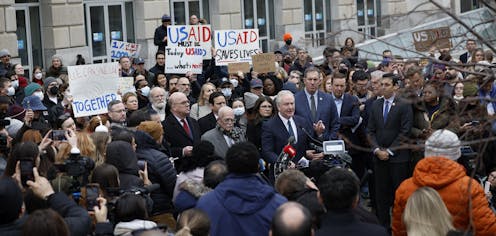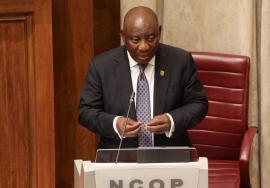
U.S. foreign aid is in disarray.
The Trump administration froze most aid disbursements on Jan. 20. According to billionaire Elon Musk, an adviser to President Donald Trump with “special government employee status,” the U.S. Agency for International Development, widely known as USAID, had been shut down as of Feb. 3, 2025.
Although the Trump administration lacks the legal authority to do this, hundreds of people on the agency’s staff have been put on unpaid leave or fired, according to news reports.
And the agency’s official website wasn’t working. A partial replacement, however, had appeared within the State Department’s website.
I’m a scholar of public policy who researches nonprofits, which in the foreign aid sphere are often called nongovernmental organizations. These groups are responsible for carrying out many programs funded by foreign aid from governments such as the United States.
In light of the Trump administration’s attack on the government’s main foreign aid agency and the disruption of this funding, I believe it’s important to debunk three common myths:
- The U.S. spends too much on foreign aid.
- The U.S. spends more than its fair share on foreign aid compared with other countries.
- Corrupt governments squander U.S. foreign aid.
What is foreign aid?
Foreign aid consists of money, goods and services – such as training – that government agencies provide to other countries. Foreign aid falls into two broad categories: economic assistance and military – sometimes called security – aid.
Economic assistance includes all programs with development or humanitarian objectives. That tends to include projects related to health, disaster relief, the promotion of civil society, agriculture and the like. Most U.S. economic aid dollars come from the State Department budget, including spending allocated by USAID, which has operated as an independent agency since the Kennedy administration.
On Feb. 3, Secretary of State Marco Rubio declared that he was serving as USAID’s acting director, indicating that the agency was no longer independent of the State Department.
While U.S. taxpayers have long spent just a few bucks each on foreign aid every year, the impact is profound, saving millions of people from hunger, averting the worst of natural disasters such as droughts and flooding, tackling life-threatening diseases such as tuberculosis and malaria, and more.
Myth No. 1: US spends too much on foreign aid
The United States consistently spends only about 1% of its budget on foreign aid, including military and economic support. The 2023 aid managed by USAID totaled about US$40 billion.
Americans tend to believe that their government spends a far bigger share of its budget on foreign aid than it does.
In a survey the Kaiser Family Foundation conducted in 2015, it found that, on average, Americans believed that foreign aid accounts for nearly one-third of the budget. Only 3% of those polled answered correctly that foreign aid constituted 1% or less of total federal spending.
Myth No. 2: US spends more than its fair share
According to the Organization for Economic Cooperation and Development, the United States is by far the leading national source of economic assistance dollars. In 2023, it contributed $64.7 billion in overseas development assistance, far outpacing the $37.9 billion spent by Germany, the second-biggest source of that kind of aid. Some of this assistance is managed by USAID, some by the Department of State, and a small portion by other government agencies, such as the Treasury and Health and Human Services departments.
That tells only part of the story, however. The United States spends very little on foreign aid relative to the size of its economy, particularly compared with other rich countries. The U.S. spent about 0.24% of its gross national income on overseas development assistance in 2023. By comparison, Norway, the top contributor by this metric, gave 1.09% of its gross national income in overseas development aid that year. The United States ranks toward the bottom of OECD countries, close to Portugal and Spain, by this measurement.
In 1970, the United Nations General Assembly agreed that “economically advanced countries” would aim to direct at least 0.7% of their national income to overseas development assistance. Although developed countries have repeatedly mentioned this target in agreements and at summits since then, very few countries have reached that goal. In 2023, only five countries met the 0.7% target.
The OECD average was just 0.37% in 2023 – far higher than the 0.24% the U.S. provided that year.
Myth No. 3: Corrupt governments squander US aid
You may think that foreign aid consists of government-to-government transfers of money. But governments channel most aid through nonprofits such as Catholic Relief Services, public-private partnerships, private companies such as Chemonics International and Deloitte, and multilateral organizations such as the United Nations and the World Bank.
In fact, according to the Congressional Research Service, between 2013 and 2022, most U.S. foreign assistance bypassed governments altogether: NGOs received 24% of the money, for-profit companies 21%, multilateral organizations 34%, and other organizations, such as universities, research institutes and faith-based organizations, 7%.
When the political scientist Simone Dietrich researched this question, she found that the United States outsources a lot of its foreign aid to NGOs. This is especially the case with the support it provides countries with bad governance and rampant corruption such as Sudan and Sri Lanka, which could be likely to squander or swipe those funds.
To be sure, corrupt governments sometimes do squander U.S. foreign aid. But it is important to understand that most aid never enters the coffers of those corrupt governments in the first place.
Even without Trump’s proposed cuts, US fails to lead
Even if Trump fails at his current bid to greatly reduce foreign aid spending, other countries, including the United Kingdom and Denmark, are spending far more on economic assistance for the world’s poorest people, as a share of their economies, than the U.S. does.
Slashing foreign aid would damage U.S. credibility with American allies, reduce U.S. influence around the globe and – as a group of more than 120 retired generals and admirals predicted when Trump tried to slash foreign aid in his first administration – make Americans less safe.
Parts of this article appeared in a story first published on April 6, 2017, and have been updated.
![]()
Joannie Tremblay-Boire does not work for, consult, own shares in or receive funding from any company or organization that would benefit from this article, and has disclosed no relevant affiliations beyond their academic appointment.















